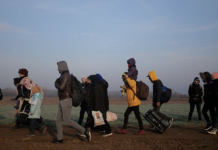4 October 2024, Tbilisi, Georgia. Tatia Gochadze, sheniekimi.ge
Migration is a global phenomenon that continues to reshape societies and health systems. According to the United Nations, there are over 280 million international migrants worldwide, including refugees and displaced persons. Many of these individuals face significant barriers in accessing healthcare, including language differences, cultural misunderstandings, and even institutional discrimination.
To address these challenges, the World Health Organization (WHO) developed Global Competency Standards for Health Workers to help healthcare professionals provide culturally sensitive, people-centered care to refugees and migrants.
The Global Challenge
Millions of displaced people often arrive in countries where healthcare systems may not be fully prepared to meet their specific needs. Language barriers, cultural differences, and unfamiliar healthcare systems can leave refugees and migrants vulnerable. The WHO standards help health workers navigate these complexities to offer equitable care to all patients.
Professor Giorgi Pkhakadze, Chair of the Public Health Institute of Georgia, explains:
“Globally, migration is reshaping public health. Healthcare workers need a standardized approach to ensure refugees and migrants receive the same compassionate care as others.”
By adopting the WHO’s Global Competency Standards, healthcare systems worldwide can better meet the growing needs of diverse populations.
Regional Challenges
Migration is not just a global issue but also a regional one. In Eastern Europe, the Caucasus, and Central Asia, countries are experiencing increasing flows of refugees and migrants, many escaping conflict or economic instability. These regions often act as both transit and host nations, creating additional strain on healthcare systems.
Health workers in these areas face challenges in delivering culturally responsive care. “In regions like ours, cross-border migration is changing the healthcare landscape,” notes Professor Pkhakadze. The WHO standards help ensure that health workers have the skills to provide appropriate care while fostering regional cooperation in addressing these shared health challenges.
Cultural Sensitivity as a Core Principle
One of the biggest obstacles in providing healthcare to refugees and migrants is cultural sensitivity. Many displaced individuals come from backgrounds with different norms regarding health and wellness. Misunderstandings between healthcare workers and patients can result in poor health outcomes or reluctance to seek care.
The WHO Global Competency Standards place a strong emphasis on cultural sensitivity. Health workers are encouraged to actively engage with interpreters or cultural mediators to ensure clear communication. By building trust through respect and understanding, health workers can significantly improve health outcomes for refugees and migrants.
Importance for Georgia
In Georgia, the number of refugees and migrants has been steadily rising, creating both opportunities and challenges for the healthcare system. Georgia plays a unique role in the region, acting as both a host and transit country for many displaced people from neighboring nations affected by conflict or economic hardships.
Professor Pkhakadze emphasizes the importance of implementing the WHO competency standards in Georgia, with a special focus on translating these standards into Georgian:
“Our healthcare workers must be equipped with the right tools to address the health needs of refugees and migrants. Implementing these standards in the Georgian language will make them more accessible to our medical professionals, ensuring that Georgia’s health system remains inclusive and capable of providing high-quality care to everyone.”
Why is it important for Georgia and the region?
1. Growing Migrant Population: The Caucasus region, including Georgia, is increasingly becoming a destination for refugees and migrants. Ensuring that health workers have access to culturally appropriate training in their local language is essential for improving healthcare outcomes for these populations.
2. Healthcare System Development: Implementing international standards like those from the WHO is a step forward in modernizing Georgia’s healthcare system. It strengthens the capacity of health workers to handle the diverse needs of migrants and refugees, many of whom come from regions with high health risks.
3. Regional Leadership: By adopting and implementing the WHO standards, Georgia can position itself as a leader in healthcare within the region, setting a benchmark for other neighboring countries to follow. This would not only improve public health but also foster better regional cooperation in managing migration health challenges.
Collaboration is Key
The WHO’s standards also emphasize collaboration between health teams and social services. Healthcare workers are encouraged to partner with community organizations and social support networks to address not just medical needs but also the broader social determinants of health, such as housing and mental health.
This holistic approach is crucial for vulnerable populations, such as refugees and migrants, who often face multiple challenges beyond just healthcare access. By fostering these partnerships, health workers can provide more comprehensive care, helping to improve the well-being of displaced individuals (14).
Conclusion
The rise in global migration presents significant challenges for health systems worldwide, but it also offers an opportunity to create more inclusive and resilient services. The WHO Global Competency Standards for Health Workers provide a clear framework for improving healthcare delivery to refugees and migrants, ensuring that these populations receive the compassionate, high-quality care they deserve.
Enroll in the free, self-paced Global Competency Standards e-course: https://bit.ly/3Y5juaZ
References
1. United Nations. International Migration 2020 Highlights. UN Department of Economic and Social Affairs [Internet]. 2020 [cited 2024 Oct 3]. Available from: https://www.un.org/en/desa/international-migration-2020-highlights
2. World Health Organization. Migration and health. WHO [Internet]. 2021 [cited 2024 Oct 3]. Available from: https://www.who.int/health-topics/migration
3. International Organization for Migration. Migration in Eastern Europe. IOM [Internet]. 2023 [cited 2024 Oct 3]. Available from: https://www.iom.int/regions/eastern-europe
4. European Centre for Disease Prevention and Control. Health concerns for migrants in Eastern Europe. ECDC [Internet]. 2023 [cited 2024 Oct 3]. Available from: https://www.ecdc.europa.eu/en/publications-data/migrant-health-eastern-europe
5. World Health Organization. Migration and public health systems. WHO [Internet]. 2022 [cited 2024 Oct 3]. Available from: https://www.who.int/migration-health
6. World Health Organization. Cultural sensitivity in health systems. WHO [Internet]. 2021 [cited 2024 Oct 3]. Available from: https://www.who.int/culture-health
7. International Organization for Migration. Addressing cultural barriers in migrant health. IOM [Internet]. 2022 [cited 2024 Oct 3]. Available from: https://www.iom.int/migrant-health-cultural
8. World Health Organization. Migrant health and cultural mediators. WHO [Internet]. 2021 [cited 2024 Oct 3]. Available from: https://www.who.int/migrant-health-cultural-mediation
9. United Nations. Refugee situation in Georgia. UN [Internet]. 2023 [cited 2024 Oct 3]. Available from: https://www.un.org/refugee-situation-georgia
10. European Union Agency for Fundamental Rights. Migrant healthcare and cultural sensitivity. EUFRA [Internet]. 2023 [cited 2024 Oct 3]. Available from: https://fra.europa.eu/en/publication/2023/migrant-health-cultural
11. World Health Organization. WHO Global Competency Standards for Health Workers. WHO [Internet]. 2021 [cited 2024 Oct 3]. Available from: https://www.who.int/migrants
12. World Health Organization. Migrant health and social determinants. WHO [Internet]. 2022 [cited 2024 Oct 3]. Available from: https://www.who.int/social-determinants-health
13. International Federation of Red Cross and Red Crescent Societies. Migrant health systems report. IFRC [Internet]. 2023 [cited 2024 Oct 3]. Available from: https://www.ifrc.org/migrant-health
14. International Organization for Migration. Promoting the health of migrants. IOM [Internet]. 2022 [cited 2024 Oct 3]. Available from: https://www.iom.int/promoting-health-migrants
#drpkhakadze #sheniekimi





